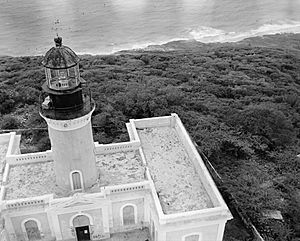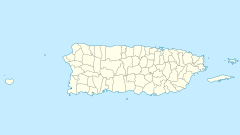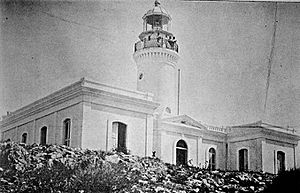Caja de Muertos Light facts for kids
 |
|
| Image taken in 1978 | |
|
|
|
| Location | Ponce, Puerto Rico |
|---|---|
| Coordinates | 17°53′35.37″N 66°31′16.28″W / 17.8931583°N 66.5211889°W |
| Year first lit | 1887 |
| Automated | 1945 |
| Foundation | stone base |
| Construction | stone (Classical revival) tower |
| Tower shape | cylindrical tower with balcony and lantern atop a keeper's house |
| Markings / pattern | gray tower, black lantern |
| Original lens | Third-order Fresnel. |
| ARLHS number | PUR 003 |
| USCG number | 31925 |
The Caja de Muertos Lighthouse, also known as Faro de la Isla de Caja de Muertos, is an old lighthouse built in 1887. It stands on Caja de Muertos, an island near Ponce, Puerto Rico. This lighthouse is special because it has a unique "T" shape, like a Cross of Lorraine. It's built on the highest point of the island.
Contents
History of the Lighthouse
The lighthouse was built in 1887 by the Spanish government, which ruled Puerto Rico at the time. It was designed to be a "3rd order" lighthouse, meaning it had a powerful light. The first light system was made by a company called Sautter, Lemonnier & Company in 1885.
In 1945, the lighthouse became automated, which means it no longer needed a person to operate it. The Puerto Rico Department of Natural Resources later restored the lighthouse. Today, it has a lookout point and a museum. In 2009, the government of Puerto Rico announced plans to make Caja de Muertos Island and its lighthouse a special focus for the department.
The Faro de la Isla de Caja de Muertos is an important lighthouse. It has a unique design that stands out among other lighthouses built by the Spanish, and even those built later under American rule.
Why This Lighthouse is Special
This lighthouse is important because its design is very unusual compared to other lighthouses in Puerto Rico. It has a distinct "T" shape, sometimes called a Cross of Lorraine or double-arm shape.
It looks a bit like the Isla Culebrita Light. However, the Caja de Muertos Lighthouse is a great example of how lighthouses can be both useful and beautiful at the same time.
Lighthouse Design and Style
The lighthouse sits on the highest point of Caja de Muertos, Puerto Rico. Its most striking feature is its unique "T" shape.
Inside, the main entrance leads to a small hallway. This hallway connected to the living areas for the lighthouse keepers. The tower, which holds the light, is in the center of the building. It has a square base. On either side of the tower base were rooms for the engineer and for storage. There was also a room for the oil used to power the light.
The living areas for the keepers were arranged in two parallel sections. They included a living room, two sleeping rooms, and a kitchen-dining area. These rooms connected to another hallway that led to the bathrooms. Each room had windows to let in light.
The tower itself is a strong, round structure, about 19 meters (62 feet) tall, including the top lantern. It has a spiral staircase inside that leads up to the lantern room. The lantern room is where the light is housed. It is made of cast-iron, copper, and glass.
The original light system used a special lens called a "3rd order lens," made in France in 1885. This lens had a central drum that rotated to create flashes of light. The drum was powered by a clockwork system. The original light flashed white every 3 seconds and could be seen from 18 miles away.
In 1923, the way the light flashed was changed. Then, in 1945, the light was made electric and automatic. This meant it no longer needed someone to watch it all the time. The old lens was replaced with a newer one. The building itself was left empty for a while. The lighthouse still has its original neo-classic decorative parts, like its cornices and pediment.
Images for kids
 | Selma Burke |
 | Pauline Powell Burns |
 | Frederick J. Brown |
 | Robert Blackburn |




